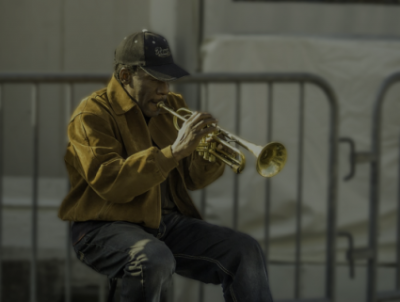.
.
New Short Fiction Award
Three times a year, we award a writer who submits, in our opinion, the best original, previously unpublished work.
Paul Perilli of Brooklyn, New York is the winner of the 53rd Jerry Jazz Musician New Short Fiction Award, announced and published for the first time on March 15, 2020.
.
.
_____
.
.p

.
Paul Perilli grew up in Massachusetts and now lives in Brooklyn, NY. His fiction and nonfiction have been published in dozens of magazines in the US and internationally. You can check out his website at, https://paulperilli.com/.
.
.
___
.
.
photo Creative Commons CC0

.
Market & Fifth, San Francisco, 1986
(An excerpt from the novella “Testaments”)
by Paul Perilli
.
_____
.
…..You walk on the rose-colored strip of concrete that starts on the sidewalk, goes under the big black awning with the street light shining on it, and stops at the two heavy wood doors inviting in all of Central Ave. You pause long enough for Walt, the bouncer you should never irritate to the degree of getting his exclusive attention, to nod you inside even though he knows you. Past the doors, music’s coming out of Cleanhead’s alto sax bright and fast. He’s no miniature presence up there leading the thing, on the bandstand in the center of the room positioned so you can see the musicians playing no matter where you sit. Even at the bar where the long mirror reflects them so you don’t have to spin in your stool to watch.
…..This is where Jimmy puts us last time we were together. Ten Spot. Center of the strip that was the center of things itself in L.A.
…..We’re on the sidewalk. I’ve been playing here most of the two years since I got out of Chino; fourteen months for possession. Wind that never lets up, like it’s got an endless source, comes off the Bay whipping at us, blowing at our shirtsleeves and pantlegs. People rush past, hurrying out of the buildings to live their own lives a while. It’s the time I usually make most of my money. But it wasn’t right to tell that to Jimmy after so many years gone by since the last time.
…..He still had those big smiling eyes that always made you want to smile with him. I think they blessed him in a way some others we knew back then weren’t. Gave him a good feeling about himself. Kept him from doing too much personal harm.
…..Things have changed. He still gets to a club now and then but he gave up the life, going to the after hours places where they serve you booze in coffee cups, and the police coming round not to inspect it and arrest you all but to be paid off. He has a job selling building supplies, and seeing the quality of the clothes he’s wearing, no need to tell me it’s going well.
…..Anyway, Jimmy says, Central Ave.’s no longer the place we remember. Clubs are closed, boarded up, torn down, graffiti painted. All of them: Last Word, Alabama, Casa Blanca. Even Dolphin’s where you could buy records, drugs and booze twenty-four hours a day. Nothing’s taken their places except poverty and trouble. It’s all here, he taps his head to let me know what we remember is all that’s left. The scene’s moved up near the valley and it’s not the same one we knew.
…..I get the picture, I say, same way everything’s going, though I’m not sure exactly what I mean by this.
…..Money men are in on everything, Jimmy fills in the answer for me. Everywhere you go you need to have lots to have a good time. We needed it too, but nothing like you do now.
…..He thinks about what he just said. About money. Head drops to my paper cup filled with change and some folded bills. That’s when I remember it’s there, and I get the urge to kick it across the street.
…..Instead I say something funny about it. How I come out here once in a while to play, to try to get the feeling back. But the voice I want to convince Jimmy that everything’s all right with does anything but that. He’s known otherwise since he picked me out on the sidewalk with my trumpet, blowing a sound not near like it was when we last saw each other. Street playing was all he needed to know to figure out the story we didn’t talk about. Eyes told me just what else he knew about me too, everything that had gone on since I saw him in L.A. almost twenty years ago, at Ten Spot. Wondering how a man’s life comes down to this?
…..Jimmy remembers it better than me, who can’t bring up the night at all. Ten Spot was a favorite place of ours. I wasn’t playing and we were having a good time, is what he says about it. A really fine time.
…..What I remember most was the high living, avoiding nothing that came our way. Drugs. Booze. Ladies. And there were plenty of all of those around. Even on a day off, no gig to go to, most of us couldn’t break the habit of staying away. The round-the-clock action that always made you feel you were missing something if you weren’t in it. If you were looking for something to do that’s where you went to find it in all of L.A. Everyone came through there, all the big names on the West Coast and from the other coast and spots in between.
…..We talk another while. Somewhere in it I bend slow. Take my horn and hat up from the sidewalk. Jimmy must see the pain I feel in my legs and stomach. But I didn’t stop like I would’ve if he wasn’t there. Got down later to get them. There’s plenty in the cup, and could’ve been more. Weather’s still warm enough for people to stop and drop something in it. It’s been a good day and I want to go spend some of what I made. I stuff it all in my coat pocket with the change already there. Turning, I start to leave. But Jimmy wants to go on some more. Ask the questions he hasn’t got to, that I’m not going to let him. The answers are there for the picking. All he has to do is reach a hand out to grab them.
…..Wait, wait, Lewis, here, take something, Jimmy says in the voice that makes you think it’s coated with molasses. His fingers slip a twenty from a wallet that has more of em in there. A bill that big comes my way once or twice a year, I guess. Much as I want to take it, need it, I say thank you, say I can’t.
…..The hug I give him is quick, like you do to someone from long ago you went through something with but don’t know so well anymore and will probably never see again. Then I’m off.
…..Same old Lewis, Jimmy says to my back. Makes me feel good he does that. Remembers the Lewis back in L.A. I can feel him still standing there. Twenty still out waiting for me to pick it from his fingers. Damn, I coulda used it.
…..On the way to my room over on Mission I keep thinking how it’s been years since I spoke to someone from then. And I hadn’t been in any hurry to. You can’t hide in the world. Someone always comes along and finds you, even in your weakest moment. Maybe only then, when you’re down low and it’s difficult to get up at all. I left L.A. when I come up this way to prison. Folsom. Worst I ever been in. The bottom of the world. When they locked me up seven-and-a-half for stealing money and hurting a man. Left all of them, I mean. The people I knew. Ones you thought the most of. Like Jimmy. He looked better than ever, like the years hadn’t worn him down but made him into the person he was supposed to be, and what happened twenty years ago helped shape it. I was happy for him. In business instead of hurting himself and everyone close. I wished the best for the rest we knew, but you know better than to think everyone made it out all right.
…..Jimmy had been surprised to see me playing on the corner. Same one I always play on. Where people know me. Market and Fifth. When once I played on stage and in a studio. Gave me a look like he’d never expected to see me again. That told me all I needed to know about the talk going on about me. They were thinking of me in the past only. And it’s not something I’m so disappointed about.
…..I keep wishing Jimmy never saw me. But something he said comes back. That makes me feel good. I know he wanted to pick me up with it and I wanted to wait until we weren’t together to think about it some more.
…..What did he call them? My testaments? That prove I was one of the best.
…..Lewis, in two recordings you did more than many do in a whole life of playing. Jimmy smiled, his eyes dropped to the sidewalk. My best shoes needed some fixing but they were polished. I shine them every day before going out. I want to look good for the people who stop to listen, who appreciate what I’m playing even though it’s not my best, who give me something. You’re still someone though you’re on Market and Fifth and not in a big name club.
…..What I felt I played. What I wanted to say you heard. That’s all I could tell Jimmy. Same as now. Though there’s a difference.
…..He already knew that..
.
___
.
.
.
.
.




























